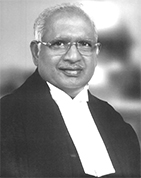
Meet Justice K.G. Balakrishnan and his Notable Judicial decisions
Justice K.G. Balakrishnan served as the 37th Chief Justice of India from January 14, 2007, to May 12, 2010, marking one of the longest tenures in Supreme Court history. Born on May 12, 1945, in Kerala, he was the first Dalit to hold the position of CJI, symbolizing a significant milestone in the Indian judiciary. His legal career began in Ernakulam, where he practiced both civil and criminal law before ascending through the Kerala, Gujarat, and Madras High Courts as judge and Chief Justice.
Judicial Career and Philosophy
Justice Balakrishnan was known for his pragmatic approach, commitment to social justice, and efforts to expand access to justice. He played a pivotal role in the National Legal Services Authority, promoting legal aid for marginalized communities. Over his Supreme Court tenure, he authored 219 judgments and participated in 787 benches, with a strong focus on criminal law, caste-based reservation, and constitutional matters.
Landmark Judgments
1. Mandal Commission Case (OBC Reservations)
Justice Balakrishnan led the five-judge bench that upheld the constitutionality of 27% reservation for Other Backward Classes (OBCs) in educational institutions. He emphasized that reservations were essential for achieving social and economic equality but clarified that the benefits should not extend to the "creamy layer" among OBCs, ensuring that affirmative action targeted the most disadvantaged.
2. Sanjay Dutt v. State of Maharashtra (1994 Bombay Blasts)
In this high-profile case, Justice Balakrishnan refused Bollywood actor Sanjay Dutt's request to contest elections while his appeal against conviction was pending. The decision underscored the gravity of the charges and the importance of maintaining the integrity of public office.
3. Bellary Mining Case
Justice Balakrishnan upheld the High Court’s decision to concretize the boundary between Karnataka and Andhra Pradesh and ordered a halt to mining operations until proper demarcation was completed. This judgment reinforced judicial oversight in environmental and inter-state disputes.
4. School Lunch Programme
In a significant order, Justice Balakrishnan mandated the statutory implementation of the school lunch programme, providing relief to millions of underprivileged children and helping reduce school dropouts due to financial constraints.
5. Internet Regulation and Hate Speech
Justice Balakrishnan ruled that hate speech and pornography should be banned from the internet, and that posting hateful content, even against political parties, was subject to censorship, reflecting his stance on responsible digital expression.
Legacy
Justice K.G. Balakrishnan is remembered for his landmark contributions to social justice, minority rights, and judicial reforms. His judgments on reservations, environmental protection, and public welfare have had a lasting impact on Indian law and society. After retirement, he served as the longest-tenured Chairperson of the National Human Rights Commission, furthering his commitment to human rights and justice.












comments